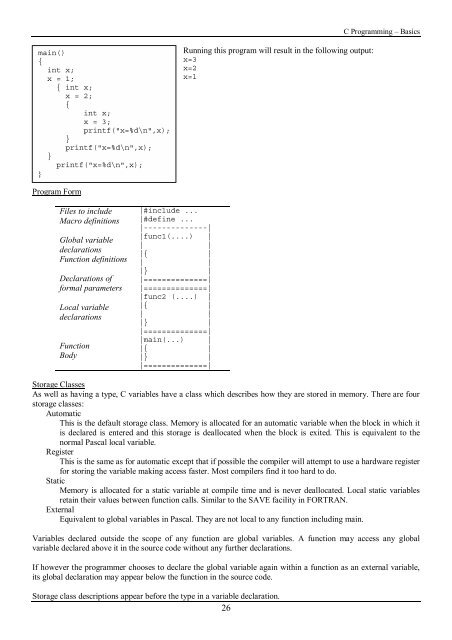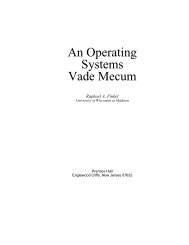Create successful ePaper yourself
Turn your PDF publications into a flip-book with our unique Google optimized e-Paper software.
C Programming – Basics<br />
main()<br />
{<br />
int x;<br />
x = 1;<br />
{ int x;<br />
x = 2;<br />
{<br />
int x;<br />
x = 3;<br />
printf("x=%d\n",x);<br />
}<br />
printf("x=%d\n",x);<br />
}<br />
printf("x=%d\n",x);<br />
}<br />
Running this program will result in <strong>the</strong> following output:<br />
x=3<br />
x=2<br />
x=l<br />
Program Form<br />
Files to include<br />
Macro definitions<br />
Global variable<br />
declarations<br />
Function definitions<br />
Declarations of<br />
formal parameters<br />
Local variable<br />
declarations<br />
Function<br />
Body<br />
|#include ...<br />
|#define ...<br />
|--------------|<br />
|func1(....) |<br />
| |<br />
|{ |<br />
| |<br />
|} |<br />
|==============|<br />
|==============|<br />
|func2 (....) |<br />
|{ |<br />
| |<br />
|} |<br />
|==============|<br />
|main(...) |<br />
|{ |<br />
|} |<br />
|==============|<br />
Storage Classes<br />
As well as having a type, C variables have a class which describes how <strong>the</strong>y are stored in memory. There are four<br />
storage classes:<br />
Automatic<br />
This is <strong>the</strong> default storage class. Memory is allocated for an automatic variable when <strong>the</strong> block in which it<br />
is declared is entered and this storage is deallocated when <strong>the</strong> block is exited. This is equivalent to <strong>the</strong><br />
normal Pascal local variable.<br />
Register<br />
This is <strong>the</strong> same as for automatic except that if possible <strong>the</strong> compiler will attempt to use a hardware register<br />
for storing <strong>the</strong> variable making access faster. Most compilers find it too hard to do.<br />
Static<br />
Memory is allocated for a static variable at compile time and is never deallocated. Local static variables<br />
retain <strong>the</strong>ir values between function calls. Similar to <strong>the</strong> SAVE facility in FORTRAN.<br />
External<br />
Equivalent to global variables in Pascal. They are not local to any function including main.<br />
Variables declared outside <strong>the</strong> scope of any function are global variables. A function may access any global<br />
variable declared above it in <strong>the</strong> source code <strong>with</strong>out any fur<strong>the</strong>r declarations.<br />
If however <strong>the</strong> programmer chooses to declare <strong>the</strong> global variable again <strong>with</strong>in a function as an external variable,<br />
its global declaration may appear below <strong>the</strong> function in <strong>the</strong> source code.<br />
Storage class descriptions appear before <strong>the</strong> type in a variable declaration.<br />
26
















